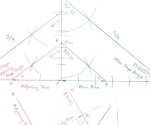Archive for April 6th, 2009
insuperable
Posted by thewordmaven (David Settle) in Watchword of the Day on April 6, 2009

Congrats to the North Carolina Tar Heels. They looked pretty invincible tonight.
Watchword of the day: insuperable n. incapable of being overcome.
Angle of repose
Posted by thewordmaven (David Settle) in Word Watching on April 6, 2009

A few years ago while on vacation, I found myself in a small bookstore in Estes Park, Colorado looking for a good novel written by a “Western” author, to fit in with the locale. The store owner recommended Wallace Stegner’s Pulitzer Prize winning story, Angle of Repose. I was unfamiliar with Stegner’s work at the time, but having now read several of his books, I would highly recommend him. My favorite is his posthumously published collection of short stories Marking the Sparrow’s Fall. Today’s phrase comes from the title of the first Stegner book I read.
angle of repose n. the maximum slope, measured in degrees from horizontal, at which loose solid material will remain in place without sliding.
Drive by any self-respecting dam in Texas and you will typically see a large incline of rocks abutting each side of the spillway. In order to save on space and materials, civil engineers place the rocks at the steepest angle possible without causing a rock slide. This is known as the angle of repose; repose meaning “a state of rest.” Add one more degree of incline and you end up with the angle of repose’s first cousin, the angle of slide, whose meaning should be self-explanatory and avoided by civil engineers at all costs.
Civil engineers love angles. They make up a big part of their training, so it’s not surprising that there are a number of phrases that incorporate angle and relate in some way to engineering. There’s angle of depression, used by surveyors as the angle between the point of observation and the point of the object being observed, if the object is below the observer; if it’s above the observer, the term is angle of elevation. Other angle phrases include angle of attack, angle of deviation, angle of incidence, angle of lag, angle of lead, angle of pitch, and so on. It’s easy for me to see why I never pursued an engineering degree.
Angle comes to us from the Greek word onkos meaning hook. An archaic British definition of angle is a fishhook, which leads us to the word angling, a close substitute term for fishing-something else that I enjoy when in Colorado when not reading Stegner. As any high school student can tell you, angles are a big item in geometry, the branch of mathematics that sounds like it would naturally deal with the earth, as geo- is the prefix for earth. Geometry deals with relationships of points and angles in space-not the outer kind, but the metaphysical inner space. So, I’ve always thought that geometry was misnamed and would be more accurately called esometry, eso- being the prefix for inner. But I seem to be going off on a tangent.
Orient
Posted by thewordmaven (David Settle) in Uncommon Definitions of Common Words on April 6, 2009

The word orient is a very occidental word. It comes from the Latin orient, and even further back to the Greek ornynai, meaning to rise. The word has always been associated with rising, the sunrise, and east, which makes sense since the modern term is most associated with the East, and the Orient is located east of Greece, Rome, and all points of occidental origin. Over the years, this common word has taken on several alternate meanings, some of which have obvious links to its roots.
orient n. 1. a moderate to strong blue. 2. dawn; the time of day associated with the sunrise. 3. a very high quality gem, especially a pearl with an exceptional luster. 4. used in navigation, the place on the horizon where the sun rises. 5. adj. ascending; especially, rising in the sky. 6. vt. in mathematics, to assign to a surface a constant outward direction at each point.
Eyeservice
Posted by thewordmaven (David Settle) in There's a Word for That? on April 6, 2009

Come on, admit it. Sometimes we all work a little more efficiently if we know the boss is likely to walk around the corner and see what we’re up to. This universal trait is the inspiration for this “There’s a Word for That?” word.
eyeservice n. work performed only when an employer is present.